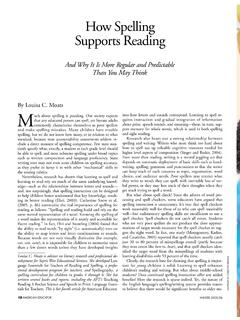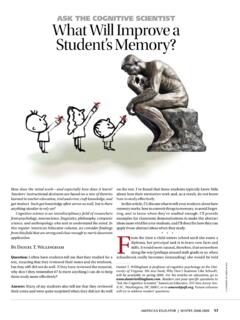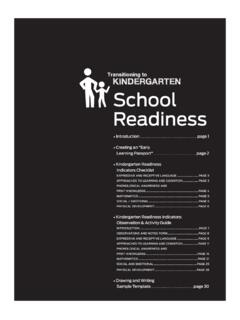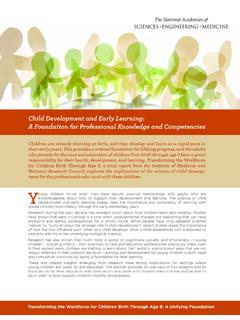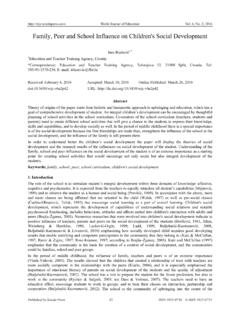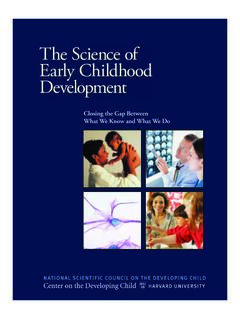Transcription of Ask thE CognItIvE sCIEntIst Why Does Family Wealth Affect ...
1 AmERIcAN EdUcATOR | SPRING 2012 33 How does the mind work and especially how does it learn? Teachers instructional decisions are based on a mix of theo-ries learned in teacher education, trial and error, craft knowledge, and gut instinct. Such knowledge often serves us well, but is there anything sturdier to rely on? CognItIvE science is an interdisciplinary field of researchers from psychology, neuroscience, linguistics, philosophy, computer science, and anthropology who seek to understand the mind. In this regular American Educator column, we consider findings from this field that are strong and clear enough to merit class-room Daniel T. WillinghamQuestion: Why do wealthy kids usually do better in school than poor kids?Answer: Disadvantaged children face a host of challenges to academic success. These challenges fall into two broad categories. First, as one might expect, wealthier parents have the resources to provide more and better learning opportunities for their chil-dren.
2 Second, children from poorer homes are subject to chronic stress, which research from the last 10 years has shown is more destructive to learning than was previously guessed. But research also shows it s not all about money. Common knowledge does not always turn out to be true, especially in matters relating to school-ing. But when it comes to Wealth and educational outcomes, common knowledge has it right: on average, kids from wealthy families do significantly better than kids from poor families. Household Wealth is associated with IQ1 and school achievement,2 and that phenomenon is observed to varying degrees throughout the Household Wealth is asso-ciated with the likelihood of a child graduating from high school4 and attending With a more fine-grained analysis, we see associations with Wealth in more basic academic skills like read-ing achievement6 and math And the association with Wealth is still observed if we examine even more basic cogni-tive processes such as phonological awareness,8 or the amount of information the child can keep in working memory (which is the Ask thE CognItIvE sCIEntIstWhy Does Family Wealth Affect learning ?)
3 Daniel T. Willingham is a professor of CognItIvE psychology at the University of Virginia. His most recent book, Why Don t Students Like School?, is designed to help teachers apply research on the mind to the classroom set-ting. For his articles on education, go to Readers can pose specific questions to Ask the CognItIvE sCIEntIst by send-ing an e-mail to Future columns will try to address read-ers BY dANIEL BAXTER34 AmERIcAN EdUcATOR | SPRING 2012mental space in which thinking occurs),9 or the extent to which the child can regulate his emotions and thought these effects are not due to household income alone. In fact, it s unlikely that they are directly due to income at Imagine showering cash on a low-income Family ; there will not be a sudden boost to the children s cognition or academic achievement. The effects of Wealth must be indirect and must accrue over time. Indeed, researchers believe that a useful way to conceive of the impact of Wealth is that it provides access to opportunities.
4 Money is an obvious enabler of opportunities: cash buys books, and summer enrichment camps, and access to tutoring if it s needed. But in addition to financial capital, two other types of capital afford opportunities for children : Human capital refers to the skills or knowledge of individuals, usually based on their education and experience. Parents who have a good deal of human capital in the form of education will, in subtle and overt ways, impart their knowl-edge to their children . So cial capital refers to beneficial con-nections in social networks, such as ties to people with finan-cial or human capital. Parents with a lot of social capital might have friends or relatives who can provide helpful summer intern-ships for their child, or they might be more likely to have well-placed friends who can advocate for their child if he has a problem at , we d expect finan-cial, human, and social capital to be related. For example, some-one who attends college is increasing her human capital through education, but she will also make friends in college and thus have connections (social capital) with other well-edu-cated That is why, rather than simply measuring Family Wealth , most researchers use a composite measure called socioeconomic status (SES) that includes measures of Family income, parental education, and parental does SES Affect educational outcomes?
5 Most theories fall into one of two categories. Family investment models offer an intuitive mechanism: high-SES parents have more capital, and so can invest more in their children s Stress models suggest that low SES is associated with long-term stress that has two consequences: it makes parents less effective, and it has direct, negative biological consequences for children s maturing brain These models are not mutually exclu-sive. Both could be right, and indeed, there is evidence that both factors contribute to the difficulty that low-SES students have in school. Indeed, much of the challenge in this research is sepa-rating the many factors that can have multiple effects and tend to occur together. For example, crowded housing conditions occur because of lack of financial capital and likely have direct effects on children s learning (it s hard to study in a crowded, noisy environment) as well as indirect effects (crowding makes health problems more likely and leads to greater stress).
6 Despite these challenges, researchers have succeeded in identifying some of the many factors that contribute to the greater academic problems faced by students in low-SES families. Let s take a look at some of this evidence, bearing in mind that the studies cited here used methodologies that separate the effects of these co-occurring Investment TheoriesSome factors associated with SES seem to be straightforward consequences of the amount of money available to the Family . For example, low-income families cannot as readily afford books, computers, access to tutors, and other sources of academic Indeed, these sources of intellectual stimulation are asso-ciated with better school out-comes,16 and many poor families cannot afford There are other, more subtle consequences of SES, and these effects are present even before a child is born. Low-SES mothers tend to have less adequate access to health care, so their babies are at greater risk for low birth weight,18 which is a risk factor for CognItIvE impairment19 with con-sequences measurable at least into middle There is also a high incidence of fetal alcohol syndrome in children born to low-SES Fetal alcohol syndrome is caused by alcohol abuse by a woman when she s pregnant, and it results in a host of CognItIvE deficits for the infant.
7 The greater incidence in low-SES pregnancies is thought to result not only from differences in mothers drinking habits but, at least in part, from interactions with poor nutrition and possibly genetic Once born, children in low-SES families have overall poorer health, which has a lasting impact on educational They are more likely to have a nutritionally inadequate diet24 and poor access to health care,25 which likely has wide-ranging health consequences. They are more likely to develop serious chronic health problems,26 which make low-SES kids miss more days of school than their peers,27 which in turn is associated with negative school Missing school is particularly destructive for low-SES kids; they benefit more from school than their wealthier counterparts,29 presumably because their homes There are subtle consequences of low socioeconomic status, such as greater risk for low birth weight, which is a risk for CognItIvE EdUcATOR | SPRING 2012 35and neighborhoods do not provide the same CognItIvE richness and challenge.
8 Poor children are also exposed to a number of risks in their physical They are more likely to live in substan-dard housing with greater exposure to lead, and subsequently show higher blood lead levels than wealthier Even a trace amount of lead is known to have serious negative effects on Kids in low-SES families are also more likely to share a room and generally to live in more crowded conditions,33 which is known to Affect academic This effect may be due to the simple fact that a more crowded home is noisier, making it more difficult to concentrate, but crowding also likely makes it harder for parents to maintain a calm, orderly home, which also impacts the best-known effect of financial capital on schooling is that wealthier families often seek housing in what they believe to be superior school districts. But even before children start school, kids from higher-SES families are likely to have daycare providers who are less harsh and more sen-sitive than daycare providers of lower-SES kids; higher-quality daycare is associated with better math and reading scores through elementary And once kids start school, poor children are more likely to have teachers who are less experienced or have marginal There is also evidence that, when teaching mathematics, teachers of poor children are more likely to emphasize basic computations rather than more advanced pro-cedures and their conceptual underpinnings.
9 The teachers of low-SES students also spend less classroom time on instruction. These data indicate that teachers are not emphasizing basic instruction because the kids are less capable; rather, low-SES kids are more likely to be assigned to teachers who emphasize basic of the foregoing effects are consequences of reduced finan-cial capital. Human capital the knowledge and skills of the parents that can be imparted to their children is also important. For example, a great deal of evidence shows that low-SES parents speak less often to their children , and with a more limited vocabu-lary and simpler syntax, than their high-SES counterparts,39 a phenomenon that begins when children are still Moth-er s speech in particular is tightly linked to toddler vocabulary There is some evidence that this effect is partly due to differences in parents knowledge about child development . Par-ents who know more about how children learn and grow talk to their children in more complex ways and more often solicit ideas from their children , and high-SES parents more often have this There is also evidence that the crowded homes of low-SES families contribute: when the home is crowded, parents are more likely to talk to children briefly and in in low-SES families are read to by their parents less often,44 and they watch more television than their high-SES Their parents are less likely to buy toys that teach shapes or colors or the names of All of these sources of CognItIvE stimulation that low-SES kids miss are known to have positive impacts on reading and math scores at , more-educated parents are more concerned about imparting human capital to their children ; or at least, they are more concerned about spending time with their children .
10 Although one might suppose that parents who work more (either for extra income or out of necessity) will spend less time with their children , this effect is actually rather Parents who work more hours tend to sacrifice other activities in order to spend time with their children . Income is also a weak predictor of time spent with chil-dren, but there is a robust effect of education, with better-educated parents spending more time with their about social capital? There too, low-SES kids are at a disadvantage. Parental feeling of connectedness and involvement in their child s school is associated with student achievement,50 and low-SES parents are less involved in their children s At least part of this effect seems to be due to race and class differences that contribute to a lack of trust between parents and teachers or Low-SES kids also tend to befriend students who are themselves not engaged at TheoriesThere appears to be ample evi-dence supporting Family invest-ment theories: families with more financial, human, or social capital invest more of it in their chil-dren, and their children benefit.



